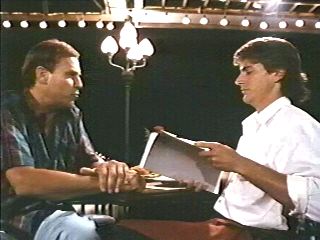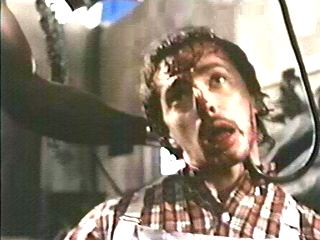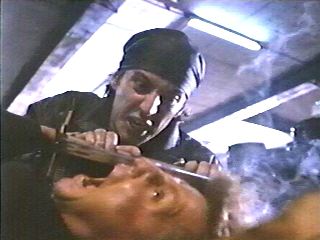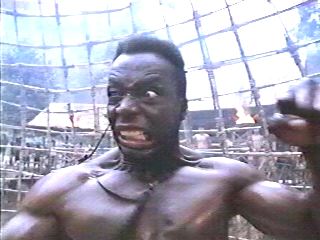
|
|
|
|
|
|
|
|
|
|
|
|
|
(1990) Director: Lucas
Lowe
One thing I am sure confuses a number of fans of action movies is why martial art sequences in western movies have, for the most part, been greatly inferior to any typical martial art sequence in an Asian movie. Even the cheapest Asian movies usually have much better fight choreography and editing than in western movies costing ten to a hundred times more. Of course, there are a lot of answers that immediately come to mind that answer a large part of this. The most obvious one is that the martial arts are not only a significant part of Asian culture, but have been so for hundreds of years - they've had a lot of time to practice and improve on their art for an audience constantly demanding more for their buck. Also, some aspects of Asian moviemaking give filmmakers more leeway - unlike their western counterparts, they are often able to spend weeks or even months to shoot a fight sequence. While those facts certainly answer a lot of the question, they also inevitably add to the mystery by prompting some new and equally obvious questions. Like: Why don't western film companies very often hire Asians who are skilled in making great fight scenes? And the few times they do hire Asians, why don't they leave them alone instead of heavily influencing them to make the fights more "western"? And why do the major Hollywood distributors hardly ever go to the trouble to simply find an Asian movie with great fights, buy the rights to it (for what would probably be considered peanuts), and release it to theaters on these shores? I personally spent some time thinking about all of this,
and I eventually came to an ugly conclusion that, much as I tried,
couldn't in the end From this and other evidence (like how the box office hit Crouching Tiger, Hidden Dragon happened to have major American involvement), the ugly conclusion I've come to is that the majority of North Americans can be considered xenophobic ignoramuses - they seem to think not only that a "good film" has to have a big budget and be made by Americans, but more often than not has to be western in its style as well. (You can safely count yourself out of this group if you're a regular reader of this site, since it shows you have at least some taste for movies not in the mainstream.) On the positive side, things are changing, albeit slowly. At least Asian stars like Chan and Li are recognized by the general population. Martial art stuntmen and fight choreographers like Cory Yuen are being hired to work on western films. And Hong Kong filmmakers are getting more of their product seen by westerners, even if it's just a straight-to-video release. Part of that's because they are making their movies more marketable by hiring American stars; recently we've had China Strike Force (with Mark Dacascos and Coolio), and David Morse appearing in Double Vision. But ten years earlier, the Seasonal Film Corporation was already doing this kind of thing, getting several of their movies released to American video stores as a result. King Of The Kickboxers may be the most entertaining of them all. As it happened, the producers decided to hire a
predominately western cast for King Of The Kickboxers,
unlike most such productions that settle for one or two Even with that vengeance angle, you have probably already guessed correctly that King Of The Kickboxers proves to be a very silly movie at times. Take that whole snuff movie operation, for example. Though they shoot with what appears to be video cameras, they have everything else a movie shoot would have - spotlights, a full crew, even elaborate sets. And if one of their victims should refuse to perform, they have on hand a bunch of goons dressed exactly like the Blues Brothers to shoot warning shots. All this effort and expense is justified with someone mentioning there's supposedly a big market in Asia for movies where westerners are seen getting killed. (Well, movies like Faces Of Death have proved to be popular in that part of the world.) That interest may be understandable, given Jake's way of investigating once he reaches Thailand. His first step is to find a kickboxing school, insult everyone there, and beat the crap out of several students before walking away and muttering, "What a f*cking waste of time!" (Perhaps Jake is also related to Giorga of The Violent Professionals.) To be fair, it's shown to be a tough world; it's one where just about everyone seems to know martial arts, even small-time New York drug mobsters who look like Rod Stewart's baby brother. And speaking of lookalikes, one of the snuff film producers, always seen cuddling up to a woman, has a remarkable similarity to Russ Meyer. But as funny as many of these and other isolated moments
are in the movie, none can compare to the hilarity that comes from
Avedon's performance. His acting isn't merely bad, it's positively
surreal. He shouts about Avedon is at least given the opportunity to display his physical talents, more so than if he were on an American film. It's customary for actors to do their own stuntwork on Asian movies, this one being no exception. During the intense training montage that inevitably happens in movies like this, we get to see Avedon doing tricky things like doing the splits while standing on two rafts in a pond, or strung up in agonizing positions way up a tree with weights tied to his limbs. He also holds his own in all of his fight sequences, which are choreographed in that classic Asian style that beats the western way any day of the week. A lot of this is simply having the participants in the fight move faster, as well as making more elaborate moves, but there's more to it than that. For one thing, the camera stays focused on the participants on each shot for a longer period of time on average - no quick-cutting to artificially add energy or to mask fight inability by any the participants. The camera also tends to show all or most of the participants' full bodies in any one shot, so the fight can be seen at full effect. (This also happens to be the technique that's generally successful in making song-and-dance movies.) Lastly, the participants are often made to fight in environments that force them to fight differently, but also get them to use the environment to their advantage. A garage is a cramped place, but also has various instruments you can pick up to your advantage. A staircase can give you handy high ground, but an opponent can go under it and grab your feet. This creative way the movie has of giving the fighter's
places to battle leads up to the Check for availability on Amazon (VHS) See also: Back In Action, Expect No Mercy, Martial Outlaw |
 disprove. I
remembered an article I read several years ago that contained an
interview with action director/producer James Glickenhaus. Part of the
article concerned his 1985 movie The Protector, which
Jackie Chan starred in as an attempt to break into the western market.
If you've seen it, most likely you agree with Chan that it was a
terrible movie; in fact, Chan not only reshot a good portion of it for
the Asian market when he returned to Hong Kong, he immediately
afterwards made the vastly superior Police Story as a
kind of comeuppance to Glickenhaus. Anyway, Glickenhaus defended the
way he directed The Protector, saying in effect that
Chan's way was well and good, but the western market wouldn't go for
it. And unfortunately, evidence seems to suggest he was right. Look at
how Chan's Hong Kong movies have done here; Rumble At The Bronx
did okay (certainly not blockbuster business), but subsequently the
other theatrically released ones (like Supercop or The
Legend Of Drunken Master) fared pretty poorly. Yet his inferior
American-made movies like The Tuxedo and Rush Hour
have fared much better! And it's not just with Chan. For example, few
people here seemed interested in seeing Jet Li's Hong Kong movie Black
Mask, but they showed a lot more interest in seeing him in the
inferior western movies Kiss Of The Dragon and The
One.
disprove. I
remembered an article I read several years ago that contained an
interview with action director/producer James Glickenhaus. Part of the
article concerned his 1985 movie The Protector, which
Jackie Chan starred in as an attempt to break into the western market.
If you've seen it, most likely you agree with Chan that it was a
terrible movie; in fact, Chan not only reshot a good portion of it for
the Asian market when he returned to Hong Kong, he immediately
afterwards made the vastly superior Police Story as a
kind of comeuppance to Glickenhaus. Anyway, Glickenhaus defended the
way he directed The Protector, saying in effect that
Chan's way was well and good, but the western market wouldn't go for
it. And unfortunately, evidence seems to suggest he was right. Look at
how Chan's Hong Kong movies have done here; Rumble At The Bronx
did okay (certainly not blockbuster business), but subsequently the
other theatrically released ones (like Supercop or The
Legend Of Drunken Master) fared pretty poorly. Yet his inferior
American-made movies like The Tuxedo and Rush Hour
have fared much better! And it's not just with Chan. For example, few
people here seemed interested in seeing Jet Li's Hong Kong movie Black
Mask, but they showed a lot more interest in seeing him in the
inferior western movies Kiss Of The Dragon and The
One. foreign actors. Among the supporting players
are Richard Jaeckel (The Dirty Dozen) and Don Stroud (
foreign actors. Among the supporting players
are Richard Jaeckel (The Dirty Dozen) and Don Stroud ( half of his
dialogue, even in scenes of a less intense nature, such as the subplot
involving the woman (Sherrie Rose, Black Scorpion) he meets and
gets romantically involved with. Speaking of shouting, he also has a
couple of solitary moments when he shrieks with agony over the hurt of
his past. You might think these particular scenes possibly couldn't be
overacted, but Avedon somehow manages to do it. But whether he's
shouting or not, Avedon goes though most of the movie with an "I'm such
a cool badass!" attitude that is positively arrogant - however,
this attitude is just so unbelievably overdone that you can't get
annoyed by it, because you are laughing too hard. In fairness to
Avedon, it seems that his outlandish performance came more from the
encouragement of the director than himself; there are a couple of
moments when things get quiet and serious enough that give Avedon the
opportunity to show that he can act pretty well if encouraged to do so.
But I have to admit that I probably wouldn't have found King Of
The Kickboxers as entertaining as it is now if Avedon had
been made to give a good performance. It certainly fits better with the
other ridiculous things that the movie has on display.
half of his
dialogue, even in scenes of a less intense nature, such as the subplot
involving the woman (Sherrie Rose, Black Scorpion) he meets and
gets romantically involved with. Speaking of shouting, he also has a
couple of solitary moments when he shrieks with agony over the hurt of
his past. You might think these particular scenes possibly couldn't be
overacted, but Avedon somehow manages to do it. But whether he's
shouting or not, Avedon goes though most of the movie with an "I'm such
a cool badass!" attitude that is positively arrogant - however,
this attitude is just so unbelievably overdone that you can't get
annoyed by it, because you are laughing too hard. In fairness to
Avedon, it seems that his outlandish performance came more from the
encouragement of the director than himself; there are a couple of
moments when things get quiet and serious enough that give Avedon the
opportunity to show that he can act pretty well if encouraged to do so.
But I have to admit that I probably wouldn't have found King Of
The Kickboxers as entertaining as it is now if Avedon had
been made to give a good performance. It certainly fits better with the
other ridiculous things that the movie has on display. movie's best scene, the climatic bout between Jake and
Khan. Most likely inspired by Max Max Beyond Thunderdome,
it takes place inside a gigantic wooden dome with several platforms of
different heights, and with sharpened bamboo stakes sticking out of the
water below. Though the fight may be considered a little short by fight
aficionados, it otherwise delivers everything a final cinematic fight
should have, high-kicking stunts, brutality, and a feeling of real
struggle. A bonus asset the fight has is the time the movie spent
previously into building Jake's opponent into a menacing and dangerous
foe. As Khan, Billy Blanks is a fantastic villain. He doesn't have that
much dialogue, and the little he speaks admittedly does come out a
little clownish because of that same direction affecting Avedon's
performance. But otherwise, he's one scary dude, gnashing his teeth,
veins pulsing out of his muscled body, and looking really
intense. And every kick and blow comes across as serious business, even
in slow motion. It's too bad that Blanks seems to have left the film
world behind for Tae-Bo; if there's any real disappointment to come
from seeing King Of The Kickboxers, it's from that
realization.
movie's best scene, the climatic bout between Jake and
Khan. Most likely inspired by Max Max Beyond Thunderdome,
it takes place inside a gigantic wooden dome with several platforms of
different heights, and with sharpened bamboo stakes sticking out of the
water below. Though the fight may be considered a little short by fight
aficionados, it otherwise delivers everything a final cinematic fight
should have, high-kicking stunts, brutality, and a feeling of real
struggle. A bonus asset the fight has is the time the movie spent
previously into building Jake's opponent into a menacing and dangerous
foe. As Khan, Billy Blanks is a fantastic villain. He doesn't have that
much dialogue, and the little he speaks admittedly does come out a
little clownish because of that same direction affecting Avedon's
performance. But otherwise, he's one scary dude, gnashing his teeth,
veins pulsing out of his muscled body, and looking really
intense. And every kick and blow comes across as serious business, even
in slow motion. It's too bad that Blanks seems to have left the film
world behind for Tae-Bo; if there's any real disappointment to come
from seeing King Of The Kickboxers, it's from that
realization.